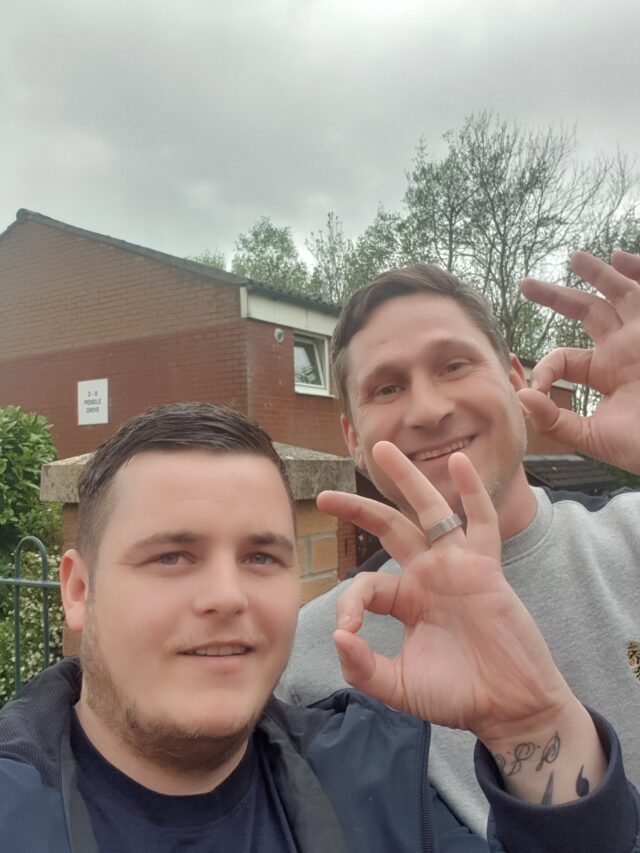Last week's remarkable run of football results proved just how powerful a drug the game can be – the world's greatest happy pill when it goes your way, the biggest downer when it does not.
Like many, Wayne Beck was "buzzing" the morning after Liverpool's win over Barcelona, and he was watching as a neutral, but the drug analogy is more relevant for him as he has struggled with bipolar disorder since he was a teenager, a struggle he is winning thanks to football.
Fifteen months ago, Beck and his friend Paul Davies helped to set up Blokes United in Blackburn.
According to its website and social media pages, it is a confidential, non-judgemental, social inclusion group that offers support from experience and, most importantly, "football therapy". They had no idea if anyone would turn up to the first session in February 2018 or, if they did, they would come back for a second.

Last week, they had nearly 80 people at their two sessions – they expanded to Darwen last year – and are now considering expansion to Accrington and Burnley, with a boxing venture to come soon, too.
Speaking to Press Association Sport ahead of Mental Health Awareness Week, Beck said: "The only place I have ever felt like I really belong is on the pitch. You can find everything in life there: teammates, decisions you disagree with, knocks, triumphs, it's life.
"I wanted to be a footballer when I was a young kid but as I got a bit older I thought I could be a really good PE teacher. Life didn't pan out that way but this is my dream job now.
"We got some T-shirts printed last year and I see the lads walking around with them on, heads held high, chests puffed out.
"I'm the talker but I play, too. I use it for my own therapy. It's exercise, you can lose weight, improve skills and feel like a kid again. But most of all, you're not alone."
Get yourselves registered with @CFC_com_ #socialinclusion #mentalhealth pic.twitter.com/9GGUw3iDFn — SIFL (@One2Blackburn) May 3, 2019
Beck is from East Yorkshire but ended up in a psychiatric hospital in Lancashire when his condition took him down one of the dark alleys he must always be careful to avoid.
The idea for Blokes United actually started in Hull, where former Coventry and Cambridge forward Jamie Barnwell-Edinboro was doing community work with the city council and the Football Association.
Barnwell-Edinboro and Beck were friends via football and when Beck was recuperating in Lancashire, his pal visited and the idea for taking Blokes United across the Pennines emerged.
Beck was already involved in the Social Inclusion Football League run by Blackburn-based social services organisation Creative Support and based at Rovers' indoor centre. With backing from the club and National Lottery, the league has more than 20 teams that travel from as far away as Derby and Wales.
But Beck, Davies and a few friends wanted something less formal and more inclusive, something that would not scare off people still deep in recovery, those taking their first steps back to independence or "angry lads from the council estate".
The format is simple. An hour of football, followed by a "chat, banter or chinwag" in the Butlers Arms in Blackburn or Entwistle Hotel in Darwen, the pubs that provide "brews or beers, some grub and a bit of space" for the group after their games.
Great session tonight @DarwenAcademy fellas! 31 lads down, some great football played. Good number back @entwistlehotel for free pizza and chips Keep up with the encouraging each other lads, remember that's what it's all about!#feelgoodfactor#footballtherapy#dontbeonyertod pic.twitter.com/B1GiivhKIu — Blokes United (@united_blokes) April 29, 2019
Beck says it is needed because most support services are nine-to-five operations and there is nothing in the evenings when the temptation to self-medicate is at its highest. He says it works because all are welcome and nobody is judged.
"We ask for £2 a session – if you play, you'll know that isn't much for football, but if you ain't got it, you ain't got it and then it can't be inclusive," said Beck.
But with pitches to hire, kits to buy and courses to pay for – Blokes United is already starting to turn out coaches, new referees and guys with mental health first aid certificates – funding is crucial.
The landlords at their pub bases have been very generous and a local tattoo artist raised £1,700 for them in a 24-hour inking session. The next stage will hopefully involve grants from the FA and Sport England, and the local council has already provided help with publicity.
When asked why he thought the idea had taken off, Davies said: "We don't tag it on social media as a mental health service – although it is – because we might scare people off. We believe stigma creates more stigma.
"A lot of people don't speak out as they don't want to go to professionals. People help themselves at our sessions without realising they are doing it – we don't ask questions!
"It breaks the isolation. People from all walks of life, who may never speak to each other, come together and it's like a little family. People feel safe."
Beck points out that in 15 months of football they have never had a fight.
"It's changed my life," said Davies.
"I see and hear people saying how much it helps them and that, for me, is greater than any amount of money. The fact we now have so many people who understand mental health is the biggest thing we wanted to achieve, to erase the stigma.
"Apart from my kids, it is proudest thing I have done. It's that simple!"
– Now in its 19th year, Mental Health Awareness Week is organised by the Mental Health Foundation and it runs from May 13-19. This year's theme is body image.
ga('create', 'UA-72310761-1', 'auto', {'name': 'pacontentapi'});
ga('pacontentapi.set', 'referrer', location.origin);
ga('pacontentapi.set', 'dimension1', 'By Matt Slater, Press Association chief sports reporter');
ga('pacontentapi.set', 'dimension2', '5dae16aa-ee9b-4fc2-aee9-090799f51441');
ga('pacontentapi.set', 'dimension3', 'paservice:sport,paservice:sport:football,paservice:sport:uk,paservice:sport:world');
ga('pacontentapi.set', 'dimension6', 'story');
ga('pacontentapi.set', 'dimension7', 'composite');
ga('pacontentapi.set', 'dimension8', null);
ga('pacontentapi.set', 'dimension9', null);
ga('pacontentapi.send', 'pageview', { 'location': location.href, 'page': (location.pathname + location.search + location.hash), 'title': 'Blokes United: How football is erasing mental health stigma in Blackburn and beyond'});







